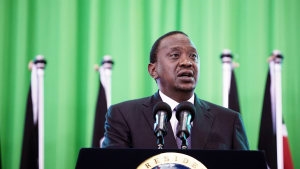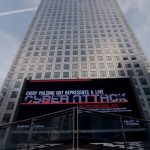Murder, Fake News, And Hacking Concerns Cloud Disputed Kenyan Election
Kenyan protesters took to the streets after a tense Friday election resulted in a disputed victory for incumbent President Uhuru Kenyatta. The opposition party blasted the vote as a “charade,” claiming results had been manipulated by a hacker using the credentials of a recently murdered election official.
As Kenyatta—elected to another five-year term—called for unity, opposition leader Raila Odinga asked his followers to demand justice, but underscored that he was not calling for violence. There were reports on Twitter and Al Jazeera that police had used tear gas and live bullets to disperse protesters. As unrest grew in Nairobi’s and Kisumu’s neighborhoods, the government said it had mobilized 180,000 security officers to grapple with more dissent, the BBC reported.
On Saturday, officials and witnesses told Reuters that police had shot and killed eleven people during protests since the election results were announced Friday night. The Kenyan National Commission on Human Rights said that at least 24 people, including a 6-year-old child, had been killed.
Here are the tallies that the Kenyan opposition says shows the real votes in Kenya. #KenyaDecides pic.twitter.com/0jvOAtqQou
— Eyder Peralta (@eyderp) August 10, 2017
“With growing reports of demonstrations and heavy gunfire in some areas, it is important for security forces to work to deescalate—not escalate—the violence,” said Otsieno Namwaya, Africa researcher at Human Rights Watch. “The police should not use tear gas or live ammunition simply because they consider a gathering unlawful.”
“I don’t control anybody,” Odinga told CNN on Thursday. “What is happening is that people just want to see justice. We also hope that the security forces are not going to use excessive force.”
Just wondering…thought the declared winner promised peace.
Why are Kenyans suffering the highhandedness of kenyan security pic.twitter.com/0mGTgKeAdS— Chinta (@kenya_politico) August 11, 2017
John Kerry and other international observers in the country urged calm and said the results—which showed an unexpectedly wide margin of 1.4 million votes for Kenyatta—were acceptable, and that a review of the election should be conducted through the courts. Former President Barack Obama, whose father was Kenyan, has urged the country to reject “tribal and ethnic hatred” and to “work together no matter what the outcome.”
“If anything was electronically fiddled with, there is a way to go back and absolutely ascertain what happened in the polling station,” Kerry said on Thursday. Kerry—who in 2004 conceded to George W. Bush amid questions about voting in Ohio—did not discount the possibility of election tampering. But he and other international observers said the electoral system appeared mostly fair, in part because votes were collected electronically and then approved by multiple party officers from both parties at each polling station using paper forms. “So by paper ballots, there is a protection of each and every Kenyan’s vote.”
Odinga, who raised an unsuccessful legal challenge to the 2013 election, has said that his party would not return to court, but also said he would accept the results if it turned out he had lost “fairly.”
@StateDept demonstrations already rocking parts of Kenya police using live bullets locak media is put in blackout.. That’s free n fair pic.twitter.com/lz4MJY3yQb
— Godsbitsofwood (@IQNdesign) August 11, 2017
The opposition claimed that a hacker had tampered with results by using the credentials of a murdered election official, Chris Msando, whose tortured body was found outside Nairobi late last month. The commission chairman said that there was only a failed attempt to hack into the country’s voting system, and rejected the opposition’s argument over evidence that, he wrote on Facebook, is “obviously and plainly falsified and contains elementary errors.”
Are these the same people who swore to serve and protect ? #StopKisumuKillings. #KenyaPresident pic.twitter.com/m5HEYY3PCR
— Shaw Kemp Grady (@skgjnr) August 11, 2017
Fears of ethnic violence have been stoked by memories of the 2007 presidential election, which left over 1,200 people dead and thousands more homeless, and led to charges by the International Criminal Court that Kenyatta had committed crimes against humanity (the case was dropped after the Kenyan government refused to hand over evidence).
Added to the mix is the impact of fake news at a time of turmoil along political and ethnic lines. In the first-ever study aimed at quantifying the prevalence and impact of false information during an election campaign in Africa, researchers with GeoPoll found that 90% of respondents in Kenya reported having seen false or inaccurate news in relation to the general election.
Sad images all over #PostElecViolence pic.twitter.com/DwOdeT7cHy
— Robert Syundu (@RobertSyundu) August 11, 2017
Among the operatives working on the campaigns were two executives from Aristotle, an American data firm working for Odinga. They were deported last weekend over an alleged visa violation. The men, who had been in the process of converting their tourist visas, were detained by government-linked men who drove them around for hours, locked them up, temporarily confiscated their electronics, and tried to gain access to one of their computers.
Along with data and polling analysis, Aristotle said it was helping with debate prep, polling, and digital and TV advertising; it declined to say what it was being paid for its services. Aristotle told Fast Company that much of its work involved figuring out ways to fight fake news.
“Everything of this sort that happens in Kenya is politically motivated,” John Aristotle Phillips, the company’s founder and CEO, told Kenya’s The Nation after he was deported. “It’s symptomatic of a political clique that’s losing its grip.
Kenyatta’s campaign, meanwhile, raised eyebrows in May when it reportedly contracted for $6 million Cambridge Analytica, the data firm that aided Donald Trump’s victory. The Robert Mercer-backed company has worked on campaigns around the globe and courted controversy for its use of data and personality profiling. Its parent company, SCL Elections, has been involved in campaigns from Nigeria to Ukraine.
Cambridge Analytica has not responded to Fast Company‘s request for comment, but a spokesperson for the firm told the BBC that the company was not involved in any negative advertising in Kenya, and that it “has never advocated the exploitation of ethnic divisions in any country.”
Some reports had linked another political consultancy, U.K.-based BTP, to the Kenyatta campaign. But CEO Mark Pursey told The Daily Beast that those reports were”fake.” “We declined,” he said.
The skies in Kisumu sounding like a busy airbase.police chopper hovering overhead every 3mins.Periodic screams and gunfire. It is drizzling pic.twitter.com/urway17GBE
— Odeo Sirari (@OdeoSirari) August 11, 2017
The U.S. State Department on Thursday urged candidates to refrain from allowing their supporters to turn violent. “We welcome the [election commission’s] commitment to fully investigate any allegations of fraud, with the engagement of all election stakeholders,” a statement said.
President Trump, who spoke to Kenyatta in March, has yet to comment on the election.
(24)













